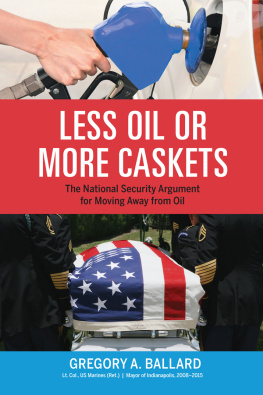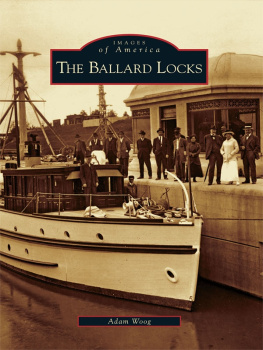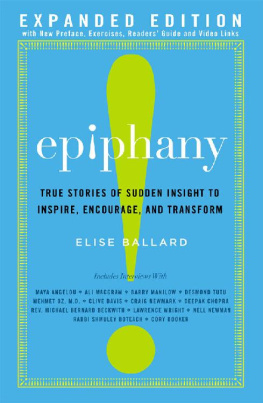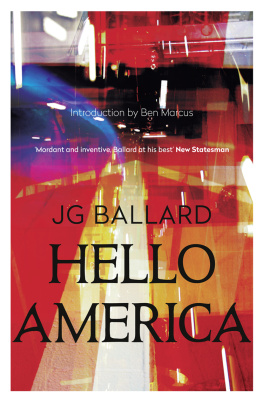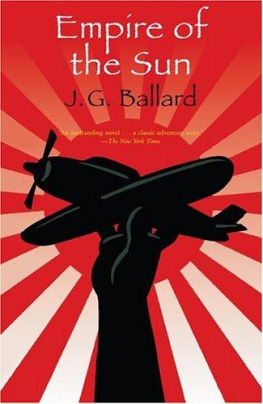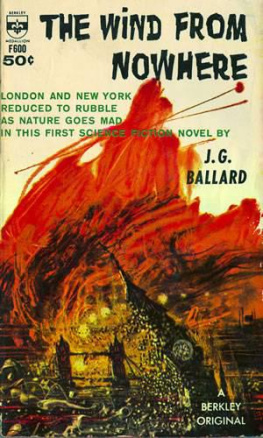LESS OIL OR MORE CASKETS
This book is a publication of
Indiana University Press
Office of Scholarly Publishing
Herman B Wells Library 350
1320 East 10th Street
Bloomington, Indiana 47405 USA
iupress.indiana.edu
2016 by Gregory Ballard
All rights reserved
No part of this book may be reproduced or utilized in any form or by any means, electronic or mechanical, including photocopying and recording, or by any information storage and retrieval system, without permission in writing from the publisher. The paper used in this publication meets the minimum requirements of the American National Standard for Information SciencesPermanence of Paper for Printed Library Materials, ANSI Z39.48-1992.
Manufactured in the United States of America
ISBN 978-0-253-03744-2 (pbk.)
ISBN 978-0-253-03745-9 (web PDF)
1 2 3 4 5 23 22 21 20 19 18
This book is dedicated to all the members of the United States military who have fought and died over the last forty years, and to those who continue to fight, to ensure that the world has sufficient energy resources. May their numbers be far fewer in the future.
Contents
M Y WIFE , W INNIE , has been with me over thirty-five years. She has been a stalwart by my side: through my Marine career, a war, my transition back into the civilian world, my eight years as a mayor, and now as we head into a more reflective period in our lives. If Ive had any success, it is a result of her staying by my side.
The University of Indianapolis has been very supportive of my postmayoral efforts, including this book. Its president, Rob Manuel, and its former provost and now president of the Independent Colleges of Indiana, David Wantz, have helped tremendously, as have so many of the great staff.
My initial editor, Peter Noot, was tremendous in making the book more readable while keeping my voice. Jeannine Allen was very helpful in providing graphical and technical support on the manuscript. Dawn Pearson was instrumental with the photos in the book. As I learned, this can be very frustrating, but Dawn hung in there, and I am very appreciative. Carrie OConnor, who was also my speechwriter while I was the mayor, provided some important initial comments.
Over the last few years, two organizations, Securing Americas Future Energy and the Truman Project for National Security, helped shape and hone my views on this important, emerging topic. In particular, Victoria Gurevich of the Truman Project went well beyond what I was expecting when I asked her a few questions. Additionally, Roger Sorkin, who created the powerful documentary, The Burden, provided focus to my views. Kellie Walsh, along with Graham Richard, formerly of Advanced Energy Economy, have also been very supportive in this regard.
Melissa Proffitt Schmidt and Holly Banta have been critical in ensuring everything surrounding the book was done correctly. Im always astounded at all the legal and administrative requirements in writing a book.
Indiana University Press, particularly Ashley Runyon, was stellar in its support of this effort. I was always amazed at how quickly and professionally they responded to my questions. I cant thank them enough.
Lastly, I would like to thank all those who helped me in my Marine career. It was a true honor to serve my country for twenty-three years in uniform, and that service developed me in so many ways that continue to positively affect my life still today. Words cannot adequately express my gratitude.
T ODAY, WHEN WE send our young men and women off to war, we pat them on the back and thank them for their service. We throw parades and homecomings upon their successful return. We sadly salute the caskets as they go by. Then we drive down to the neighborhood gas station and fill upand nobody makes the connection; no one sees the irony.
The simple question must be asked: Why are we in the Middle East? Why do we continue to pour enormous resources into an area of the world that has cost us so dearly, in both human and financial terms, over the last forty years?
We do this to maintain the global oil market. Historically, that market has been crucial to the Western standard of living because the world relied on oil for its numerous energy requirements. But that has changed. Today, the use of oil most relevant to our quality of life is for transportation energyhow we move people and goods.
Transportation is the last industry dominated by the use of oil. Electric power generated by oil is virtually nonexistent, and uses for oil in residential and commercial heating continue to fall. Only transportation and industrial uses consume significant quantities of oil in the United States, and transportation is by far the dominant userover 70 percent of total oil consumption, according to the Energy Information Administration. Worldwide, the percentage of oil consumption for transport has risen from 45 percent in 1973 to 64 percent in 2012, according to the International Energy Agency. Oil still is used for over 90 percent of transportation needs in our country and the world, and it will remain so unless new technology is understood and embraced.
Transportation energy technology is on the cusp of great changes that will allow the international economy to be free of oils chokehold. The technology of the past mandated that the United States devote enormous resources to preserving the flow of oil, not just to the United States but to all markets, so as to maintain global demand for goods and services, preserving the international economy. But emerging technologies allow us to change that dynamic. This technology will not cause us to lose our standard of living; indeed, it may enhance it. It will, however, change the strategic dynamic wherein the United States must defendat enormous costthe flow of oil, which allows the world to send money to people who want to kill us. Today, we are funding both sides of the War on Terror.
In a teaser for Roger Sorkins 2015 documentary The Burden (I appear in the film), a former soldier says, In a three-month span, I buried two guys. When I squeeze the gas pump, you know, I think about it.... Why should their families have to bear that burden? SAFE (Securing Americas Future Energy), a nonpartisan nonprofit dedicated to ending our dependence on oil, has more than a dozen retired four-star generals and admirals on its board. The military understands this issue. The Pentagon knows the importance of moving away from oil.
Talk of supporting the troops seems to fall on deaf ears, politically, whenever reducing our dependence on oil is mentioned. Supporting the troops can take on many dimensions, but sending them into conflict only when necessary should be a primary tenet. Improving conditions for the future, so that troops would not be needed, would seem to follow. Foreseeing the future is critical.
When I went to the Gulf War in 199091, maintaining the global flow of oil was critical to our quality of life. At that point, our level of technology could not overcome our need for the resources in the Middle East. There is no question that a disruption to the flow of oil at that time would have severely, if not catastrophically, affected the global economy.
The following remarks confirm this:
Former Secretary of State James Baker told PBSs Frontline that the vital national interest was to secure access to the energy resources of the Persian Gulf.
On March 17, 2005, Senator Richard Lugar put into the Congressional Record: The underlying goal of the U.N. force, which included 500,000 American troops, was to ensure continued and unfettered access to petroleum.

